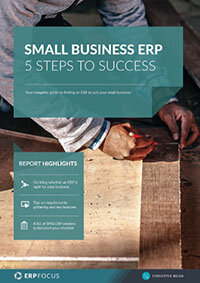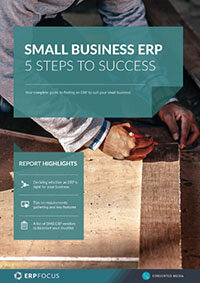ERP software selection criteria for small and medium businesses
The process for selecting ERP software for a small or medium-size business is different from the same process in larger businesses in some significant ways. Every business has their own unique ERP requirements which will inform their ERP software selection criteria, and all will have their dealbreakers during selection. Below are some of the areas where small businesses may have stricter ERP requirements, whether that be resources based, financial, or otherwise.
Ownership
Many smaller businesses have a founder or sole owner present and managing the business full time. That one person must be fully on board with the requirement for any ERP. This is true regardless of any selection requirements criteria. The owner might have seen the business grow from a simple, family origin. The owner might hope to develop a scientific breakthrough into a new kind of business. The owner might still be comfortable managing from a hands-on perspective. Until that owner sees and feels a need for ERP, little else matters.
Finance
The people who manage the finances of the business also must be on board before any ERP implementation is successful. In some small businesses, the money comes from a spouse and, perhaps, the spouses’ parents or a similar source within the family. Another small or medium-size business might have gone to an outside source for financing such as venture capital or angel financing. Here, too, if they want to spend money on developing a product or process before an ERP system, they have the final say.
The future
Now, if your small or medium business is still in the ERP market, the next selection criterion is to examine the future of the business. ERP systems have a useful life of a decade or so. Where will your business be in ten years? Can you predict now what ERP will likely be best in the future? Maybe your business has twenty employees today and operates as a sole proprietorship. If you believe it will evolve into a business with hundreds of employees and an executive management staff, aim for an ERP that meets those future requirements.
Resources
Look carefully at the resources available for implementing an ERP system. Your ideal system that perfectly meets the business requirements you define might need resources that are not available. You could, however, meet most of those requirements through a more simple ERP system that you could implement with resources at hand.
Your ERP requirements
From this point, the specific ERP criteria as a small or medium business are out of the way. Begin now to define and list your functional and usability requirements.
Finance – you will need to produce accurate financial statements that meet your internal requirements and satisfy all your external compliance requirements.
Inventory – if your business keeps inventory for manufacturing, distribution, or retail purposes, you must have a system that tracks the on-hand quantity of each item along with the cost of the items individually and collectively. Your ERP should also track transactions as the inventory is purchased, held, and sold so that you have an audit trail.
Sales orders – whether your revenue comes from product sales or delivery of services, you will want to know your backlog of existing sales orders and the history of orders as they were delivered and booked. Those orders could be from web sales or in-person visits to your store – all should be tracked.
Analytics – Your ERP will be the source of data needed to analyze your current conditions and develop targets for your future. You can also use ERP to help make decisions at all levels ensuring your business stays under control.
Develop your list of requirements. Communicate with all your team and ensure their voices are heard in making your business’ list. Rank the requirements you list and draw a line under those that are mandatory. Now as you evaluate potential ERP systems, you have a checklist. Does that ERP meet your needs or not?
Free white paper

Small business ERP: five steps to success

Featured white papers
-

Small business ERP: five steps to success
Download
Related articles
-

ERP for Food Distributors: Key Functionality
In a modern world where products are tailored to consumers, why should ERP for food distributors ...
-

Secret KPI: Why Your ERP Implementation Team Matters More Than Software
Learn how Godlan ensures successful ERP implementation for manufacturers with proven strategies &...
-

Top ERP systems for small businesses
Which ERP solutions are best for small business needs? Information on features, scalability and m...

